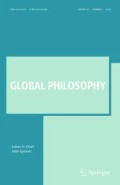Abstract
There is a rather famous “Fitch argument” that not everything that is true is knowable. There is a rather famous “Mary argument” that is often used to argue that reductive physicalism is false. This paper sets out the two side by side as the Fitch Knowability Paradox and the Mary Knowability Paradox. It is found that they have the same logical form and thus the question of validity can be evaluated with the same tools. Likening the two is useful, since it avoids the problem that since the logical forms involved in intentional and experiential contexts are unknown, we cannot be in a position to evaluate whether the Mary is deductively valid without begging questions.
Similar content being viewed by others
References
Churchland P (2004) “Knowing Qualia: A Reply to Jackson (with Postscript 1997)” in Peter Ludlow, Yujiri Nagasawa, Daniel Stoljar (2004), pp 163–178. First published in “A Reply to Jackson,” in A Neuro-computational Perspective (The MIT Press, Cambridge, 1989), pp 67–76; and as “Postscript” in Churchland PM, Churchland PS, On the Contrary: Critical essays 1987–1997 (The MIT Press, Cambridge, 1997)
Fitch F (1963) A logical analysis of some value concepts. J Symb Logic 28:135–142
Jackson F (1982) Epiphenomenal Qualia. Philos Quart 32:127–136. Reprinted in Ludlow et al (eds) (2004), pp 39–50
Kvanvig JL (2006) The knowability paradox. Oxford University Press, Oxford
Ludlow P, Nagasawa Y, Stoljar D (eds) (2004) There is something about mary: essays on phenomenal consciousness and Frank Jackson’s knowledge argument. MIT Press, Cambridge
Russell B (1927) Philosophy. W.W. Norton and Company, Inc, New York
Author information
Authors and Affiliations
Corresponding author
Additional information
Publisher's Note
Springer Nature remains neutral with regard to jurisdictional claims in published maps and institutional affiliations.
Rights and permissions
About this article
Cite this article
Landini, G. Fitch and Mary. Axiomathes 30, 193–199 (2020). https://doi.org/10.1007/s10516-019-09443-0
Received:
Accepted:
Published:
Issue Date:
DOI: https://doi.org/10.1007/s10516-019-09443-0


